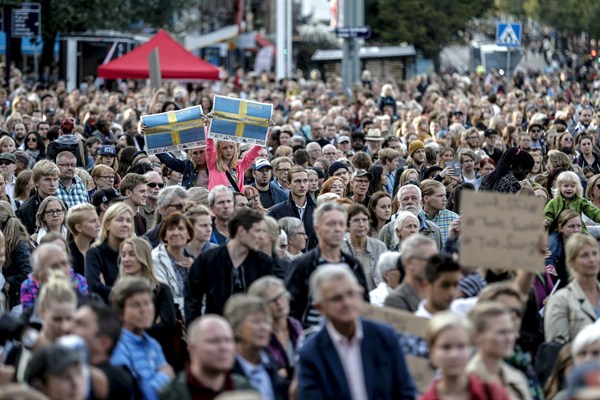Sweden, the biggest country at the heart of rich and peaceful Scandinavia, is in many ways in the eye of the current migration storm tearing through Europe. Although it is admitting fewer refugees than Germany in terms of sheer numbers, Sweden is—and has been for several years—the European Union’s biggest per capita recipient of refugees by quite a wide margin. In 2014, Sweden, a country with just 9 million inhabitants, received more than 80,000 asylum applications. This year, that number is set to grow substantially.
From one angle, no other country seems better equipped to handle this challenge. Having weathered fairly well both the recent economic crisis and a deeper transition to a globalized, European Union-infused economy, Sweden remains at, or close to, the top of global tables of wealth and well-being. It might no longer be the quasi-socialist paradise that many people looked to—and flocked to—in the 1970s, but it is one of the few European countries that still seems able to combine relatively solid growth, a strong welfare state and a genuine openness, both in economic terms and in immigration policy. Sweden is also already an “immigrant society”: At 16 percent, the proportion of its foreign-born population is higher than that of not only Germany and Great Britain, but also the U.S. In other words, Sweden is a country that should easily be able to bear its share of the burden in the biggest global refugee crisis since World War II.
Yet, looked at from another angle, Sweden seems to be on the verge of a political implosion. For some time now, amid the crises in their near and not-so-near abroad—the crumbling of the modern Middle East, the war in Ukraine and the European debt crisis—Swedes appear beset by a rapidly growing sense of insecurity. The record number of refugees, combined with the arrival of thousands of mainly Roma panhandlers from Eastern Europe, declining measures of educational outcomes and a sense of military vulnerability to Russia, has informed a widespread sense of impending doom. Politically, this feeling has manifested itself in the rise of the extreme right-wing Sweden Democrats, a party with neo-Nazi roots that garnered 13 percent of votes in the 2014 elections but is now polling at close to 20 percent.

